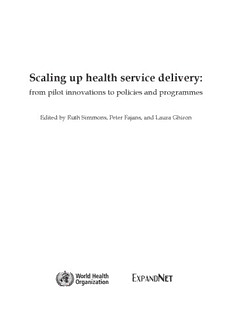Download Scaling Up Health Service Delivery: From Pilot Innovations to Policies and Programmes PDF Free - Full Version
Download Scaling Up Health Service Delivery: From Pilot Innovations to Policies and Programmes by P. Fajans in PDF format completely FREE. No registration required, no payment needed. Get instant access to this valuable resource on PDFdrive.to!
About Scaling Up Health Service Delivery: From Pilot Innovations to Policies and Programmes
This book considers the topic of scaling up from a particular vantage point. The focus is on ways to increase the impact of health service innovations that have been tested in pilot or experimental projects so as to benefit more people and to foster policy and programme development on a lasting sustainable basis. The book addresses a major failure in the global health and development field: namely the failure to expand the many successful small-scale pilot or demonstration projects that have been organized around the world so as to benefit larger populations than those initially served. It presents a conceptual framework for thinking about scaling up as well as case studies from Africa Asia and Latin America where the potential for expansion was a concern from the very inception of pilot or experimental projects. The case studies discuss family planning and related reproductive health service interventions as well as other innovations in primary health care. The case studies presented in this book share a series of common values. They emphasize the imperative to build capacity within the public sector institutions to meet the health needs to the disadvantaged. They highlight the necessity of building a strong sense of both local and national ownership in the identification of priority health needs the development and testing of local solutions and the formulation of context-specific strategies for expanding small-scale successes. The book build's upon nearly 15 years of experience with the development and testing in more than 25 countries around the world of the Strategic Approach to Strengthening Reproductive Health Policies and Programmes.
Detailed Information
| Author: | P. Fajans |
|---|---|
| Publication Year: | 2008 |
| ISBN: | 9241563516 |
| Pages: | 205 |
| Language: | English |
| File Size: | 1.426 |
| Format: | |
| Price: | FREE |
Safe & Secure Download - No registration required
Why Choose PDFdrive for Your Free Scaling Up Health Service Delivery: From Pilot Innovations to Policies and Programmes Download?
- 100% Free: No hidden fees or subscriptions required for one book every day.
- No Registration: Immediate access is available without creating accounts for one book every day.
- Safe and Secure: Clean downloads without malware or viruses
- Multiple Formats: PDF, MOBI, Mpub,... optimized for all devices
- Educational Resource: Supporting knowledge sharing and learning
Frequently Asked Questions
Is it really free to download Scaling Up Health Service Delivery: From Pilot Innovations to Policies and Programmes PDF?
Yes, on https://PDFdrive.to you can download Scaling Up Health Service Delivery: From Pilot Innovations to Policies and Programmes by P. Fajans completely free. We don't require any payment, subscription, or registration to access this PDF file. For 3 books every day.
How can I read Scaling Up Health Service Delivery: From Pilot Innovations to Policies and Programmes on my mobile device?
After downloading Scaling Up Health Service Delivery: From Pilot Innovations to Policies and Programmes PDF, you can open it with any PDF reader app on your phone or tablet. We recommend using Adobe Acrobat Reader, Apple Books, or Google Play Books for the best reading experience.
Is this the full version of Scaling Up Health Service Delivery: From Pilot Innovations to Policies and Programmes?
Yes, this is the complete PDF version of Scaling Up Health Service Delivery: From Pilot Innovations to Policies and Programmes by P. Fajans. You will be able to read the entire content as in the printed version without missing any pages.
Is it legal to download Scaling Up Health Service Delivery: From Pilot Innovations to Policies and Programmes PDF for free?
https://PDFdrive.to provides links to free educational resources available online. We do not store any files on our servers. Please be aware of copyright laws in your country before downloading.
The materials shared are intended for research, educational, and personal use in accordance with fair use principles.

